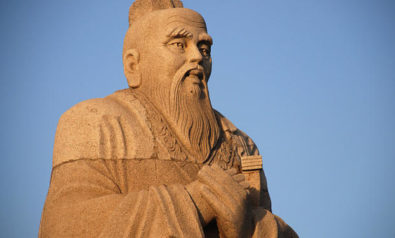What significance does Confucius’ legacy have today?
Loyalty to one’s family. Respect for the elderly. The self-cultivation of knowledge and humaneness. These are values closely identified with the people of China and East Asia, and can all be traced back to the ancient sage and teacher who lived and worked during the Spring and Autumn period of Ancient China. For much of Chinese history, Confucius’ teachings as recorded in the seminal work “Analects” formed the bedrocks of how individuals should live life and interact with others, how one should be educated, and the forms of government that should mould society and how to participate in them. Even if much of what is supposedly known of him translates merely as legend, scholars and academics have separated enough fact from the fiction to determine that, along with “Analects”, Confucius was also responsible for overseeing and editing several classic philosophical texts such as “The Five Classics”, making him the spiritual ancestor of virtually all later prominent intellectuals in Chinese, Japanese, and Korean history.
Why is Confucius Important Now?
Confucius’ legacy has survived two and a half millennia’s worth of fluctuating fortunes, including purges of his followers and suppression of his teachings, and competition from rival philosophies such as Taoism to become an icon at home and abroad. During the Cultural Revolution, Confucius’ teachings were reviled and denounced as backward feudalism; post-Mao, the Chinese government has steadily rehabilitated his image in order to fill the ideological vacuum Maoism left behind in Chinese society.
Results of this rehabilitation have been mixed. Morality in China has steadily been eroding since the reform towards a market economy, but this has not meant that people in positions of responsibility have used the name, image, and teachings of Confucius appropriately. For instance, in 2011 a private committee of businessmen created an alternative to the Nobel Peace Prize, which they termed “The Confucius Peace Prize”. It was won that year by one Vladimir Putin. In a previous iteration shut down by the Ministry of Culture, it was awarded to a Taiwanese politician known for his pro-Beijing views.
Beyond China’s borders, Confucius is a major component of the Chinese government’s efforts to increase its soft power capabilities. This is best exemplified by Confucius Institutes, which serve as overseas bases for the Chinese language and culture promotion programme run by the Chinese National Office for Teaching Chinese as a Foreign Language (usually referred to as the “Hanban”). Unlike similar programmes such as the United Kingdom’s British Council or France’s Alliance française, Confucius Institutes are not independent of the Chinese government. However, they do promote the cultivation of knowledge and are particularly valuable in that they offer excellent Chinese language and culture courses, plus cultural exchange opportunities with citizens of the host country.
The image used in this article is the property of Shutterstock. All rights reserved.
For more than 10 years, Fair Observer has been free, fair and independent. No billionaire owns us, no advertisers control us. We are a reader-supported nonprofit. Unlike many other publications, we keep our content free for readers regardless of where they live or whether they can afford to pay. We have no paywalls and no ads.
In the post-truth era of fake news, echo chambers and filter bubbles, we publish a plurality of perspectives from around the world. Anyone can publish with us, but everyone goes through a rigorous editorial process. So, you get fact-checked, well-reasoned content instead of noise.
We publish 2,500+ voices from 90+ countries. We also conduct education and training programs on subjects ranging from digital media and journalism to writing and critical thinking. This doesn’t come cheap. Servers, editors, trainers and web developers cost money.
Please consider supporting us on a regular basis as a recurring donor or a sustaining member.
Support Fair Observer
We rely on your support for our independence, diversity and quality.
Will you support FO’s journalism?
We rely on your support for our independence, diversity and quality.







